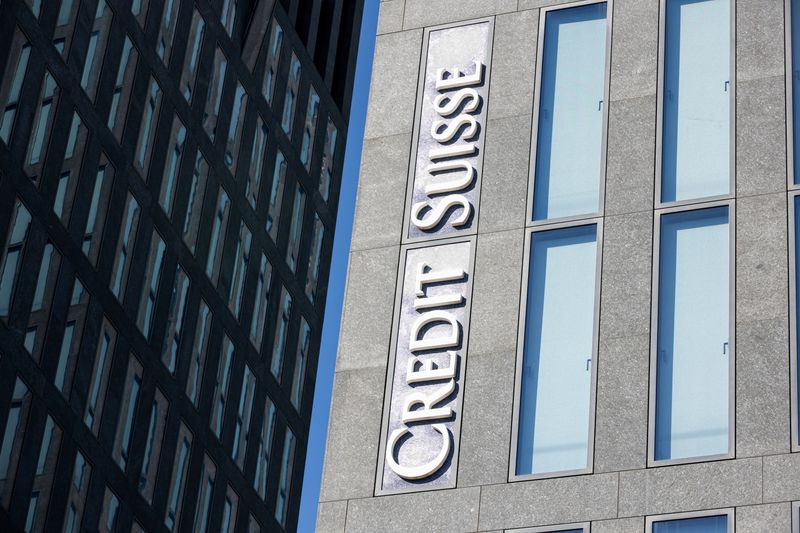
© Reuters. FILE PHOTO: A view shows the logo of Credit Suisse on a building near the Hallenstadion where Credit Suisse Annual General Meeting took place, two weeks after being bought by rival UBS in a government-brokered rescue, in Zurich, Switzerland, April 4, 2023
By Noele Illien and John Revill
BERN (Reuters) – Since Switzerland’s authorities last month pulled out all the stops to rush through a rescue of Credit Suisse, a storm has been brewing in the normally tranquil country.
Many Swiss parliamentarians have criticised the shotgun marriage, which saw Credit Suisse taken over by rival UBS for 3 billion Swiss francs ($3.3 billion) and propped up with over 250 billion francs in guarantees and support.
On Tuesday, they will meet in Bern for an extraordinary session to discuss Credit Suisse’s downfall as well as the government’s open chequebook response.
The unusual event – the third such session in over twenty years – provides parliament with a chance to reject the massive loans given as part of the rescue package.
The vote is, however, largely symbolic as the state has already committed the funds and lawmakers cannot overturn that decision.
In the lead-up to the announced merger, a sub-group of six members of parliament approved the financial commitment on behalf of the legislative body, to the ire of the almost 250 lawmakers left without a say.
“It’s the responsibility of politics to have a say especially when such a big contribution is being made by state and emergency law is being used,” said Celine Widmer, a member of the Swiss National Council for the left-leaning Social Democrats.
“We have a lots of questions that need to be answered,” she told Reuters.
“There is a lot of anger and frustration in the Swiss population and we can feel that,” said Roland Fischer, another lawmaker. “In theory, we could reject it but that would not hold up legally.”
In Tuesday’s session, lawmakers will get a chance to challenge the rushed rescue package and discuss whether conditions can be imposed on Credit Suisse.
Last week, Switzerland announced it was cutting bonus payments for Credit Suisse’s top management.
“We demand a thorough investigation into how the Credit Suisse crisis could have come about,” Thierry Burkart, leader of the centre-right FDP party, told Swiss newspaper Tages-Anzeiger.
“The de facto state guarantee of the systematically important banks is a big problem.”
Credit Suisse’s rescue angered not only politicians but many in Switzerland. A survey by political research firm gfs.bern found a majority of Swiss did not support the deal.
A poll of Swiss economists found that nearly half think the takeover of Credit Suisse by UBS was not the best solution, warning the saga has dented Switzerland’s reputation.
Switzerland’s KOF economic research institute found that 48% of the 167 university economists it questioned would have preferred a state takeover and possible later sale of Credit Suisse.
There are also growing worries about a staff cull.
In an open letter to the country’s parliament, the Swiss Bank Employees’ Association said on Tuesday that Credit Suisse and UBS must freeze any job cuts.
($1 = 0.9094 Swiss francs)





